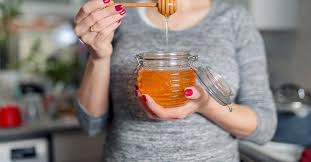
.webp)
.webp)
.webp)
Honey in Skin Care: A Natural Ingredient for Your Beauty Routine
.webp)
.webp)
Honey is more than just a sweetener for your tea—it has a long history of being used in skin care. It’s a product of bees’ hard work and contains a wealth of properties beneficial for the skin.
.webp)
.webp)
.webp)
Bees create honey by gathering nectar from flowers, and this unique ingredient has a variety of uses in beauty routines.
.webp)
.webp)
Honey’s antimicrobial, antioxidant, and anti-inflammatory properties make it a versatile and powerful skincare ingredient.
.webp)
.webp)
.webp)
Due to these impressive benefits, honey is commonly included in treatments for acne, eczema, and other skin conditions that involve inflammation or bacterial activity.
.webp)
.webp)
However, honey can also make your skin more sensitive to sunlight, so it’s important to understand both its advantages and limitations.
.webp)
.webp)
.webp)
This article will explore the benefits, risks, and uses of honey in skin care. It will also help you decide if it’s a good fit for your skincare regimen. So, let’s dive in!
.webp)
.webp)
What Is Honey Made Of?
.webp)
.webp)
.webp)
Honey is primarily composed of sugars like glucose and fructose, which account for about 80-85% of its content. The rest is made up of water (around 10-15%).
.webp)
.webp)
This makes honey an effective humectant, meaning it helps to retain moisture when applied to the skin.
.webp)
.webp)
.webp)
Beyond its sugar content, honey contains trace amounts of proteins, amino acids, vitamins, fatty acids, and phenolic compounds.
.webp)
.webp)
These additional components contribute to honey’s skincare benefits, making it more than just a sugary treat for your skin.
.webp)
.webp)
.webp)
The exact composition of honey can vary based on the plants that bees gather nectar from. For example, honey from lavender flowers might contain different compounds than honey made from borage or rose flowers.
.webp)
.webp)
Factors such as climate, storage conditions, and the types of plants in the local environment can also impact honey’s chemical makeup.
.webp)
.webp)
.webp)
One common component of honey is glycerin (glycerol), which adds to its humectant properties, helping the skin retain moisture.
.webp)
.webp)
So, whether it’s lavender honey or manuka honey, each type of honey brings its own unique benefits.
.webp)
.webp)
.webp)
Different Compositions of Bee Products
.webp)
.webp)
Honey isn’t the only bee product used in skincare. Bees also produce other substances like propolis and royal jelly, both of which have distinct compositions and benefits for the skin.
.webp)
.webp)
.webp)
What Is Propolis?
.webp)
.webp)
Propolis is a resin-like substance created by bees from tree sap. It’s thicker and stickier than honey, and it plays an essential role in protecting the hive from bacterial, fungal, and viral threats.
.webp)
.webp)
.webp)
For centuries, propolis has been used in wound care, thanks to its antimicrobial and anti-inflammatory properties.
.webp)
.webp)
Some studies even suggest that propolis could potentially help prevent or treat certain types of tumors, though more research is needed.
.webp)
.webp)
.webp)
Unlike honey, propolis has a lower sugar content, which reduces the risk of glycation (a process that can accelerate aging in the skin).
.webp)
.webp)
Additionally, propolis contains numerous active compounds like bisabolol, caffeic acid, and ferulic acid, which vary depending on the plants that the bees use to create it.
.webp)
.webp)
.webp)
While propolis has similar benefits to honey, its lower sugar content makes it a potentially better option for those concerned about glycation and its effects on aging skin.
.webp)
.webp)
Keep an eye out for an upcoming blog post dedicated to propolis and its skincare benefits!
.webp)
.webp)
.webp)
What Is Royal Jelly?
.webp)
.webp)
Royal jelly is a secretion produced by worker bees that serves as food for the queen bee. Unlike honey, which is made from nectar, royal jelly is a protein-rich substance with a completely different composition.
.webp)
.webp)
.webp)
Royal jelly contains a high concentration of vitamins, minerals, and amino acids, which contribute to its nourishing properties. Unlike honey, royal jelly is low in sugar and therefore less likely to cause glycation.
.webp)
.webp)
One of the most significant benefits of royal jelly for skin care is its ability to stimulate collagen production. Collagen is a crucial protein responsible for keeping the skin firm and youthful.
.webp)
.webp)
.webp)
Royal jelly can also help soothe inflammation and provide antioxidant protection to the skin.
.webp)
.webp)
Interestingly, royal jelly has been shown to have photoprotective properties, meaning it may help protect the skin from sun damage—something that honey cannot do.
.webp)
.webp)
.webp)
This makes royal jelly a potentially great addition to sunscreens and other high SPF products.
.webp)
.webp)
However, royal jelly is more expensive than honey, so it may not be the most affordable option for everyone. But for those looking for anti-aging benefits, royal jelly could be a worthwhile investment.
.webp)
.webp)
.webp)
The Benefits of Honey for Skin Care
.webp)
.webp)
Honey has been a staple in both medical and cosmetic practices for hundreds of years. This natural ingredient offers a wide range of benefits for the skin:
.webp)
.webp)
.webp)
Antimicrobial Properties: Honey releases hydrogen peroxide when applied to the skin, which is a potent antimicrobial agent. This makes it effective at fighting off bacteria and preventing infections.
.webp)
.webp)
Anti-Inflammatory: Honey reduces redness and swelling, making it an excellent option for treating acne, eczema, or any other condition involving skin inflammation.
.webp)
.webp)
.webp)
Antioxidants: Honey contains free radical scavengers, which help neutralize free radicals that can damage the skin’s cells and DNA.
.webp)
.webp)
This makes honey useful for addressing skin concerns like sun damage and signs of aging.
.webp)
.webp)
.webp)
Humectant: Honey is a natural humectant, meaning it helps draw moisture from the air into the skin. This makes it an ideal ingredient in moisturizers and hydrating masks.
.webp)
.webp)
Low pH: Honey’s acidic nature helps regulate the pH balance of the skin, which can be especially helpful in treating acne and oily skin. It also helps normalize the natural exfoliation process of the skin.
.webp)
.webp)
Potential Side Effects of Honey
While honey offers numerous benefits, it’s important to be aware of its potential downsides. One of the primary concerns is glycation.
Glycation occurs when sugars like those found in honey interact with proteins in the skin, leading to the formation of Advanced Glycation End Products (AGEs).
AGEs can damage collagen and elastin, two proteins responsible for the skin’s firmness and elasticity. This process contributes to wrinkles, sagging, and other signs of skin aging.
Because honey is composed largely of sugars, it can increase the risk of glycation if used frequently or in large quantities.
If you’re concerned about wrinkles or have mature skin, it’s a good idea to limit honey’s use in your skincare routine.
However, some research suggests that honey’s antioxidants and fatty acids may help protect against aging, so more research is needed to fully understand its effects on skin aging.
Is Honey Safe for All Skin Types?
Honey is generally considered safe for most people to use in skincare. It is non-toxic and doesn’t pose any significant health risks unless you have an allergy to it.
If you’re allergic to certain flowers, you should avoid honey derived from those flowers, as their phenols may still be present in the honey.
Otherwise, honey is gentle and safe for most skin types, including sensitive skin. It won’t typically cause acne either, making it a great option for those prone to breakouts.
However, if you’re concerned about glycation or skin aging, you might want to choose a different ingredient for anti-aging regimens.
Honey for Acne
Honey is a powerful natural antibiotic, making it effective at killing acne-causing bacteria on the skin.
In addition to its antibacterial properties, honey is also anti-inflammatory. This helps reduce the redness and irritation commonly associated with acne.
Due to its acidic nature, honey helps lower the skin’s pH, making it harder for acne-causing bacteria to thrive. Applying honey to acne-prone skin can help prevent breakouts and soothe irritated skin.
Honey for Dry Skin
If you have dry skin, honey can be a game-changer. Its ability to attract and retain moisture makes it an excellent hydrating ingredient.
Honey can help alleviate dry skin conditions such as eczema, flaky patches, and itchiness.
Many moisturizers and hydrating masks contain honey, so look for products designed for your skin type. Taking our skin type quiz can help you find the best options for your specific skin needs.
Honey for Sun Damage
While honey can make your skin more sensitive to the sun, it can also help treat existing sun damage. This is due to its antioxidant content, which helps neutralize free radicals caused by UV exposure.
However, honey should not be used as a sunscreen, as it won’t prevent sunburn. To protect your skin from UV rays, make sure to apply a broad-spectrum sunscreen after using honey-based skincare products.
Honey for Wrinkles and Aging
As mentioned earlier, honey’s high sugar content can contribute to glycation, which may lead to premature aging. Glycation weakens collagen and elastin, causing the skin to lose its firmness and elasticity.
However, some studies suggest that the amino acids and antioxidants found in honey could stimulate collagen production and protect against aging.
If you choose to use honey, consider following up with anti-aging ingredients like peptides, vitamin C, or retinoids to counteract any glycation effects.
Honey Masks and Other Products
Honey masks can be an excellent addition to your skincare routine, particularly for acne-prone skin.
Honey’s antimicrobial and anti-inflammatory properties make it a soothing treatment that can help clear up breakouts and calm redness.
However, honey masks should be removed before applying other skincare products or going outside, as they can increase the skin’s photosensitivity. Rinse the mask off thoroughly to avoid any sticky residue.
Conclusion
Honey is a versatile and beneficial ingredient in skincare, offering a range of advantages such as hydration, antimicrobial properties, and antioxidants.
However, its high sugar content can lead to glycation, which may not be ideal for those concerned with skin aging.
If you’re considering adding honey to your skincare routine, be sure to consider your skin type and specific needs.
Whether you’re using it for acne, dry skin, or sun damage, honey can be an effective and natural solution to many common skin concerns.
For the best results, make sure to take our skin type quiz to determine if honey-based products are the right choice for your skin.
And if you’re looking for more skincare recommendations, feel free to explore our product list featuring honey-based skincare treatments!



